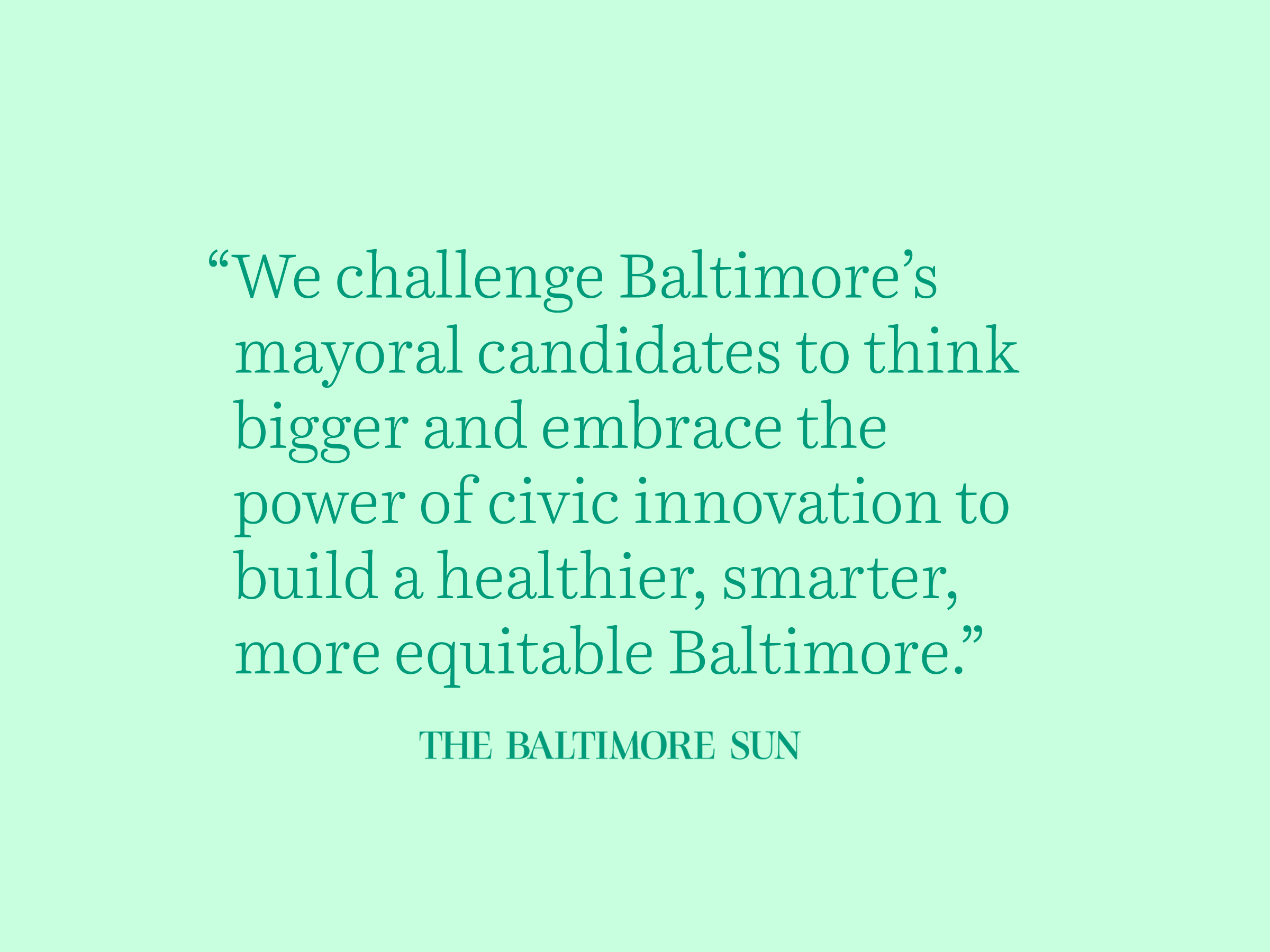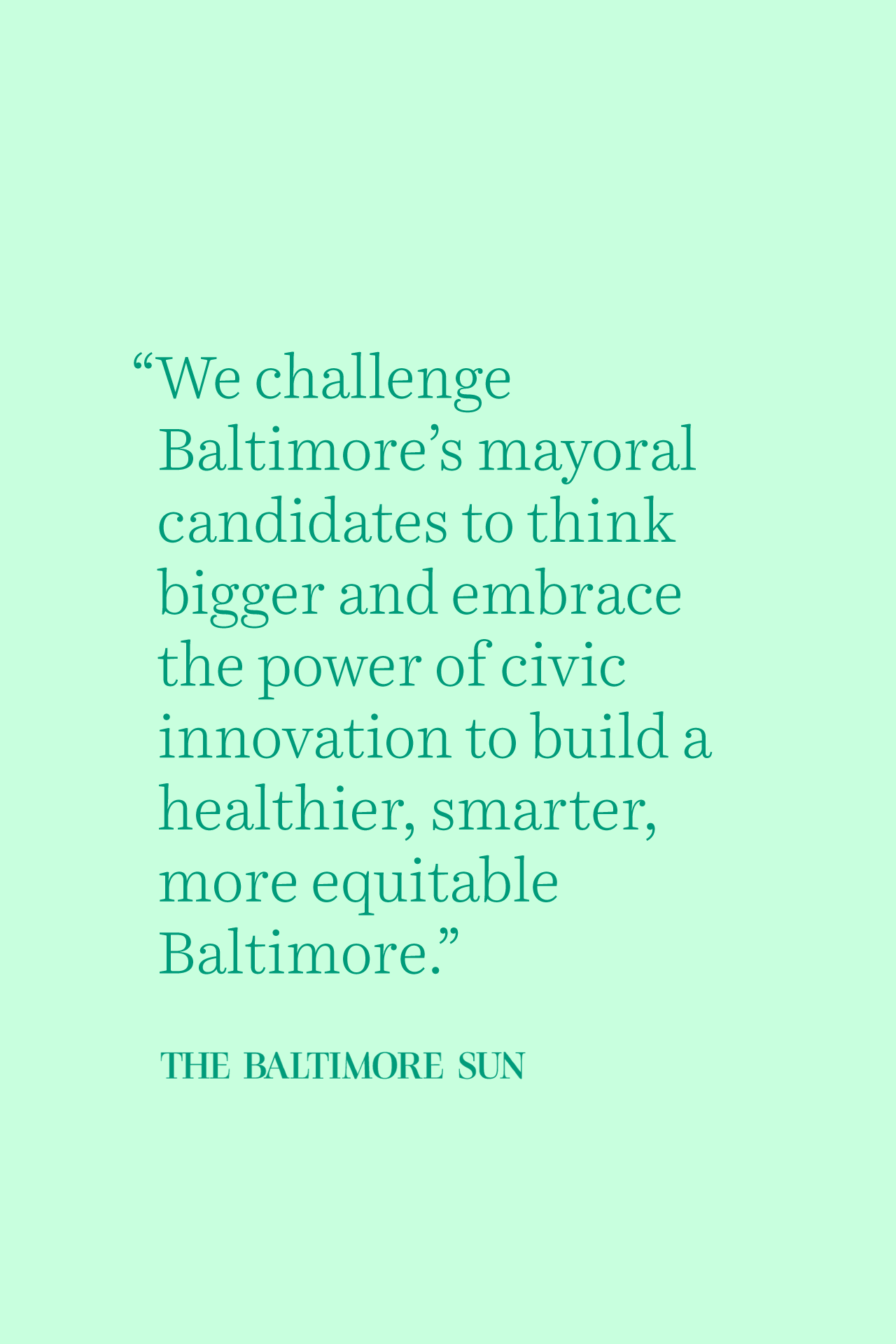By Bruce Willen & Jennifer Goold
Baltimore Sun. April 12, 2016
To become a world-class city Baltimore needs new approaches to the challenges facing its citizens and neighborhoods. Baltimore’s next mayor needs more than strong messaging and leadership; innovation must be central to his or her agenda.
We propose that Baltimore create a city office tasked specifically with civic innovation. This new office would act as a laboratory to explore methods for radically improving city operations and citizens’ lives. It should focus on Baltimore’s areas of greatest need such as education, jobs, community-police relations, transportation and vacant properties. This innovation office would apply best practices from leading-edge cities around the world and the private sector, with the well being of everyone in Baltimore as its bottom line.
Progressive cities from Mexico City to Copenhagen already explore ways for local government to incubate breakthrough ideas and solutions. In Boston, the Mayor’s Office of New Urban Mechanics (MONUM) tests tools to keep housing affordable, strengthen parent engagement, build community empowerment and provide safe and equitable streets; it supports labs on economic development, education, engagement and streetscape. MONUM also created City Hall To-Go — a truck that brings city services to far flung neighborhoods, allowing citizens to obtain permits, pay parking fines, and more without having to make long journeys downtown. And in New York, the Mayor’s Office of Tech & Innovation joined with the city’s housing authority to develop a mobile app for maintenance service, is installing 7,500 communications kiosks for free public WiFi and is working with the health department to study how pollutants affect air quality in different neighborhoods.
This new model for civic innovation brings the agility, leanness and speed of a private sector startup to municipal government, applying human-centered design approaches that can be grassroots or high-tech. By rapidly implementing and evaluating small-scale pilot programs, these civic innovation offices are helping regions around the world to become faster and nimbler, and do more with fewer resources.
Agencies in Baltimore already supply innovative programs, including OpenBaltimore, the Baltimore Food Policy Initiative and B’More for Healthy Babies. However, the structure of municipal government limits experimentation — and on a large scale, rightly so. A Baltimore innovation office would provide a safe space to experiment while allowing city agencies to stay focused on their daily operations. This office could support existing initiatives like the Budget Office’s Lean Government Innovation Fund. And it would give city agencies a platform to quickly prototype new tools, see which work in Baltimore, measure pilot programs’ results, and share lessons of success and failure.
We all experience the ways in which Baltimore should do better; this approach can speed our city’s progress. A civic innovation office would also create vital new connections with outside foundations and institutions. It would provide a platform to direct national foundation funding and resources to promising programs throughout Baltimore. Expanding such public-private partnerships can augment an overstretched city budget. And these partnerships bring fresh energy and solutions to Baltimore’s most urgent issues.
This is a critical time for our city. The governor’s plan to demolish thousands of vacant properties desperately needs fresh ideas to ensure that newly-cleared land will benefit communities. A billion-dollar school construction program offers Baltimore a chance to show national leadership by building green schools that go beyond the classroom to engage communities and revitalize neighborhoods. BaltimoreLink is a big step toward modernizing our city’s public transit and connecting residents to all corners of the city.
But bold leadership and vision will be required to realize the full potential of such initiatives and to overcome the many obstacles facing our city. Baltimore’s next mayor has an enormous responsibility but also an extraordinary opportunity to seize this pivotal moment. While our city’s path is uphill, it is also open with possibility.
We challenge Baltimore’s mayoral candidates to think bigger and embrace the power of civic innovation to build a healthier, smarter, more equitable Baltimore.
Jennifer Goold is director of The Neighborhood Design Center.
Bruce Willen is principal of design studio Post Typography.

